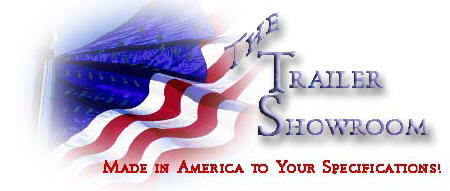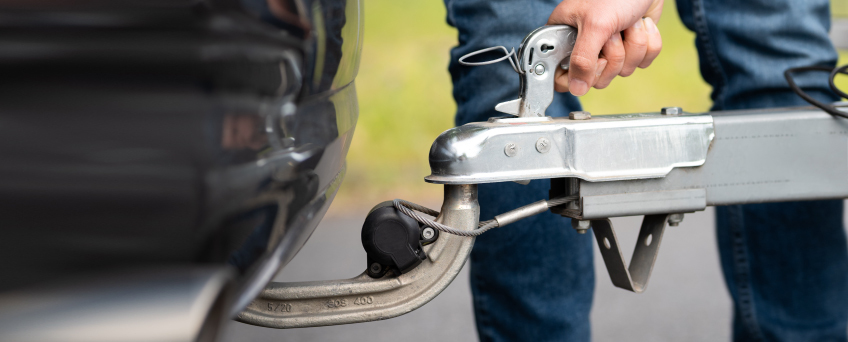Why the Right Hitch Matters
Need to haul vehicles, animals, machinery, or recreational gear? Just having a trailer and a towing vehicle is not enough. You also need an excellent-quality hitch to connect your trailer to the vehicle. An enclosed trailer hitch is a critical component for ensuring a safe, efficient, and stable ride to the destination.
Selecting the wrong hitch means load distribution is not balanced, causing vehicle swaying that can lead to accidents. A wrong hitch also puts strain on your braking and suspension systems, resulting in increased chances of skidding, uneven tire wear, an uncomfortable ride, or ineffective braking. All these effects put a big question mark on your trailer performance and safety. Choosing the right enclosed trailer hitch can help you avoid these dangerous situations.
Through this blog, we provide comprehensive guidance on different enclosed trailer hitches and help buyers pick the perfect hitch.
Understanding Enclosed Trailer Hitch Types With Their Pros and Cons
Bumper Pull Hitches
If your enclosed trailer is small to medium-sized, use a bumper pull hitch. As the name suggests, it connects to the vehicle on its bumper - either to the ball mount or the receiver hitch. Due to its design, it is generally used to tow smaller and lighter loads.
Pros:- The best merit is that you can pull these trailers and hitches with smaller vehicles. The use of smaller vehicles also enhances maneuverability on narrow roads, in tight spaces, and around sharp corners, resulting in a smoother ride.
- Since they can be easily connected to the trucks and are affordable, you save money on professional installation support and purchase cost.
- Another benefit is that you have all the truck bed space to keep cargo accessories or other items.
- These are not the best solutions for longer distances, rough terrains, and heavy-duty towing.
- Being attached to the rear part of the vehicle leads to more swaying and less stability of the trailer.
Gooseneck Hitches
A gooseneck hitch is a ball-and-coupler system that attaches to the bed of the truck using bolts. Their primary use is in heavy-duty hauling, mainly used for agricultural applications, livestock towing, and commercial transportation.
Pros:- The best aspect of a gooseneck hitch is its capability to tow heavy weights.
- The connection of the gooseneck hitch in the truck's bed leads to a more stable weight distribution that decreases swaying and fishtailing and results in more stability. This stability lets you use it for heavy-duty towing, long journeys, and in uneven terrain.
- The attachment also leaves enough space in the truck, which you can put to better use.
- Installing a gooseneck hitch into the vehicle is a challenging task; you need a professional for correct installation.
- You need a large truck to connect the hitch and tow the trailer.
Pintle Hitches
A pintle hitch is the most basic type of connection - a hook-and-loop style. There is a lunette ring on the trailer, which is interlocked with a pintle hook on the vehicle. A locking arm and a safety pin or lock secure the connection. These hitches are generally used for specialized heavy towing needs, including commercial purposes, agricultural, industrial, military, and off-road towing. You can choose a custom cargo trailer for all these needs.
Pros:- The connection of pintle hitches is such that it allows more flexibility and movement of the vehicle and trailer. It lends smoothness and ease to your towing in rough rides, uneven terrain, and other extreme conditions.
- Their high towing capacity and ruggedness result in reliable transportation of your heavy-duty cargo.
- The pintle hitch's hook-and-loop style connection lends security, durability, and maneuverability.
- You need professional guidance and support for installing and operating pintle hitches.
- They are not compatible with a few types of trailers because of the absence of lunette rings.
- Their rugged design and use in rough rides demand more maintenance for longer life.
Key Factors to Choose the Right Enclosed Trailer Hitch
Towing Capacity
When choosing a hitch, the trailer's Gross Vehicle Weight Rating (GVWR) is the foremost consideration. It means how much weight the trailer can carry, including cargo weight and its own body weight. If the hitch's rating matches or is greater than this GVWR, the hitch can handle the load efficiently; if not, the trailer sways a lot due to improper weight distribution, and control of the vehicle is lost. The hitch may even break under heavier loads than it's designed to tow, resulting in the possible loss of your trailer or, even worse, a highway accident resulting in injury or death.
Vehicle Compatibility
The hitch must be compatible with the vehicle you will use to tow the trailer. Light-duty hitches work best in the case of small cars as towing vehicles. You can use higher-rated hitches if you have heavy-duty vehicles like trucks or SUVs. Here, the trailer application matters. For heavy-duty towing of large machinery, farm equipment, cars, and recreational vehicles, you will need large towing trucks, for which the hitch must be high-rated.
Generally, the vehicle's make, design, and model help determine the right hitch, or you can refer to the hitch's guide.
Weight Distribution
In some cases, the trailer and towing vehicle's incompatibility causes uneven weight distribution, leading to a saggy rear or lifted front, swaying, and no vehicle control. Since balance is a critical factor for smooth towing, you can select the weight distribution hitches. They balance out the weight evenly on the vehicle and trailer axles, resulting in more control.
While doing this, you must also consider the trailer's tongue weight, which must be around 10-15% of the total trailer weight. Since the trailer exerts a downward force on the hitch ball, it affects the weight distribution.
Hitch Class
When choosing an enclosed trailer hitch, its class is also a critical factor. If you are hauling heavy loads, you must select a higher-rated hitch to ensure better stability and durability. Enclosed trailer hitches must be Class III, IV, or V with a greater than 3,500 lbs Gross Trailer Weight (GTW) capable of handling heavy loads. Class I and II hitches can handle gross trailer weight of up to 3,500 lbs, used for light to medium-duty towing.
Hitch Budget
Obviously, budget matters, but you cannot buy an incompatible hitch, risking your vehicle or trailer. You must find an appropriate hitch based on these four aspects. But if multiple options are available, you can compare them based on cost. While considering the hitch cost, also factor in the installation fees.
Helpful Reads:
Enclosed Cargo Trailer Upgrades and Customizations to Boost Performance
Enclosed Trailer Height Options Explained: Find the Perfect Fit For Your Needs
Types of Trailers Explained: The Ultimate Guide to Picking the Perfect One for Your Hauling Needs
7 Must-Know Towing Safety Tips for Custom Cargo Trailer Owners
Safety & Performance Features to Look For
Besides the above-mentioned key factors to look for in an enclosed trailer hitch, you must also consider the following:
- Hitches made of high-strength material like steel facilitate durability and heavy-duty towing at a lower cost, but are corrosive. Aluminum hitches are corrosion-resistant, but you have to bear with their lower strength and higher cost.
- Corrosion-resistant finishes of hitches prevent their degradation and weakness due to rusting from weather effects. This improves the hitch's performance and safety, resulting in long-term durability.
- Some hitches have built-in sway control systems that stabilize the trailer and evenly distribute the weight across the vehicle and trailer, leading to more alignment and manageable towing.
- Adjustable hitches can help level the trailer's height with the towing vehicle, causing better weight distribution and stable towing.
Conclusion - What enclosed trailer hitch do you need?
Choosing the right enclosed trailer hitch won't be a problem when you have such a detailed guide to help you navigate the factors and the purchasing process. But remember to check the hitch class, weight limits, and compatibility with the vehicle and trailer. Pay attention to the hitch's installation and regular maintenance to keep it in excellent condition.
If still in doubt, Trailershowroom.com is here. We have been helping buyers find the best trailer and hitch to fit their transportation needs and towing vehicle. Besides purchase guidance and high-quality products, we also handle hitch installation and connection for a smooth ride.
Worried about towing safety because of a mismatched hitch for your enclosed trailer? Browse our trailer and hitch combo options to find the perfect fit for a safe, stress-free, and smooth towing experience.
FAQs
-
Q1: Does the trailer coupler matter while selecting a hitch?
Yes, the coupler's size and type matter because it has to fit in with the hitch when connecting the trailer to the towing vehicle.
-
Q2: Are safety chains essential after the hitch connection?
It is recommended to have safety chains over the hitch connection between your towing truck and trailer. It ensures the connection stays intact during off-roading, extreme harsh terrain, and longer journeys.
-
Q3: What role does the mounting location of a vehicle play in the
selection of the right hitch?
Some hitches connect to the rear end of the towing truck, while some hitches are installed in the truck beds. When selecting the perfect hitch, it is crucial to match your towing vehicle's mounting location to avoid misalignment and incompatibility.
-
Q4: What is the cost of a trailer hitch?
A trailer hitch can cost anywhere between $100-$1,500, based on the type, class, and body material. If the budget matters to you, also consider the professional hitch installation cost when selecting the right enclosed trailer hitch.





